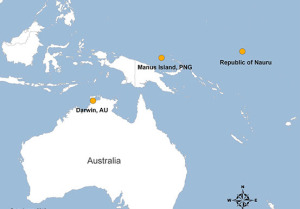December 12, 2014
Two pregnant Iranian women have agreed to enter an Australian refugee detention center, ending a three-day standoff in a bus, Australian immigration officials said.
The two women, who  have not been named, had been living on the Pacific island of Nauru, but were flown to Darwin, in far northern Australia, a week ago to give birth.
have not been named, had been living on the Pacific island of Nauru, but were flown to Darwin, in far northern Australia, a week ago to give birth.
On arriving at the airport, they boarded a bus that took them to the refugee detention center. When the women saw where they were, they refused to get off the bus. They reportedly said they had been told they would be allowed to live in the local community.
The government denies any such promise and pointed out that the women had no visas to enter Australia.
The two women, both eight months pregnant now, had tried to get into Australia by boat from Indonesia. When their families were caught, they were sent to a detention center on Nauru. Eventually, they were granted refugee status, and that allowed them to leave the detention center—but not to leave Nauru.
“The women and their families [the two husbands and one woman’s 10-year-old son] were temporarily transferred to Australia for medical purposes,” the Immigration Department said in a statement carried by the Australian Associated Press.
Nauru is an independent country with only 10,000 citizens, making it the least populous country in the world. The Island measures only four by five kilometers, one-eighth the size of Washington, DC. Its hospital is not equipped to handle complicated pregnancies.
Refugee rights activists and health groups had expressed concern for the women’s wellbeing, especially as Australia has been experiencing its hottest spring on record.
Refugee Action Coalition spokesman Ian Rintoul said that as recognized refugees, the women should have the right to live in the community while in Australia.
Asylum seekers arriving in Australia are detained, and have their claims processed in Nauru and the nearby country of Papua New Guinea. Those found to be legitimate refugees, as defined by international law, are resettled in Papua New Guinea, Nauru or Cambodia.
The government says tough policies are needed to deter asylum seekers from making the dangerous journey to Australia by boat. Polls have shown a significant number of Australians approve of the government’s tough stance.

















